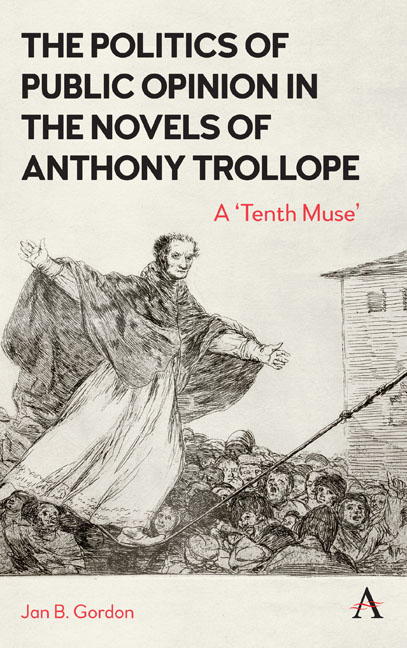Book contents
- Frontmatter
- Frontispiece
- Contents
- Preface: Overture to an Initial Public Offering
- Chapter One The “Prosthetic Body” of Public Opinion in Barsetshire
- Chapter Two Miming the Law
- Chapter Three “Playing” the Opinion Market
- Chapter Four The “Management” of Public Opinion in Trollope’s Bureaucracies
- Chapter Five The Sugar
- Index
Chapter One - The “Prosthetic Body” of Public Opinion in Barsetshire
Published online by Cambridge University Press: 17 October 2023
- Frontmatter
- Frontispiece
- Contents
- Preface: Overture to an Initial Public Offering
- Chapter One The “Prosthetic Body” of Public Opinion in Barsetshire
- Chapter Two Miming the Law
- Chapter Three “Playing” the Opinion Market
- Chapter Four The “Management” of Public Opinion in Trollope’s Bureaucracies
- Chapter Five The Sugar
- Index
Summary
It would be a calumny on Mrs. Proudie to suggest that she was sitting in her bed-room with her ear at the keyhole during this interview. She had within her a spirit of decorum which prevented her from descending to such baseness. To put her ear to the keyhole or to listen to a chink, was a trick for a housemaid.
Mrs. Proudie knew this, and therefore she did not do it; but she stationed herself as near to the door as she could, that she might, if possible, get the advantage which the housemaid would have had, without descending to the housemaid's artifice.
(BT I 166–67)If the path to heaven is as narrow as the proverbial “needle's eye,” a doctrinal idea entirely consistent with the evangelical bent of both the Rev. Obadiah Slope and Mrs. Proudie of Barchester Towers, the traditional channels of gossip appear equally constricted. Because, at least conventionally, the lower classes democratically gossip about the behavior of the upper classes (so as to bring them down to the level where they might be trafficked) rather than the other way around, Bishop Proudie's wife would do a disservice to her pronominal station were she to physically stoop to keyholes or chinks. She remains in posture as well as morally, upright, even if it is a strain. In contradistinction from the eavesdropping posture of the lower-class gossip, Mrs. Proudie misses another communicative channel of political culture: “that friendly pressure,” a little “extra squeeze of the hand” (BT I 167). Such is the inarticulated pressure conveying a bishop's consent to his chaplain's scheme for denying his wife's choice for an impending vacancy for the new warden of Hiram's Hospital. Although escaping the auditory register, it does not escape the omniscient narrator's awareness of a “force” having a formless mediacy.
Her social pride distances her from a lineage of gossips in nineteenth-century British fiction like Mrs. Bates (Emma) and Mrs. Norris (Mansfield Park); Nelly Dean (Wuthering Heights); Mrs. Cadwallader (Middlemarch); or later, the unforgettable Mrs. Bolton (Lady Chatterley's Lover). Not the unmarried singer of a community's hidden songs and secrets, typically beyond the age of marriage, an exemption which liberates them from participation in the marital market, Mrs. Proudie is the spouse of a bishop of the Church of England.
- Type
- Chapter
- Information
- The Politics of Public Opinion in the Novels of Anthony TrollopeA 'Tenth Muse', pp. 1 - 38Publisher: Anthem PressPrint publication year: 2023

